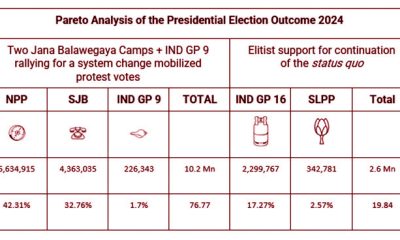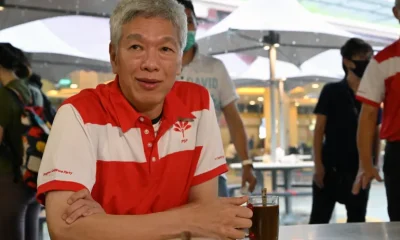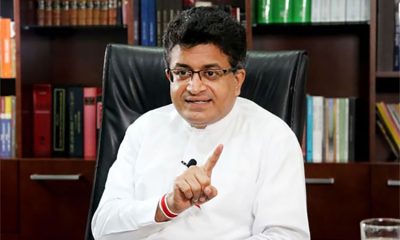Editorial
Robe, politics and karapincha

Wednesday 11th November, 2020
Former Speaker Karu Jayasuriya, who heads the National Movement for a Just Society, has paid a moving tribute to the founder leader of the association, the late Ven. Sobitha Thera. Employing apostrophe for dramatic effect, he has apologised to the Thera for the unfulfilled yahapalana promises. In fact, all yahapalana grandees and their associates should kneel around the statue of Sobitha Thera and ask for forgiveness.
The yahapalana movement was foredoomed to failure. It saw the coming together of a bunch of strange bedfellows inhabiting disparate worlds of ideologies ranging from Marxism to Capitalism, and it was no surprise that the unsteady political project collapsed like a house of cards. The yahapalana politicians got on like a house on fire during their struggle to bring down the Rajapaksas, but lost the plot and fell out after achieving that target.
One of the key protagonists of the yahapalana revolution, Maithripala Sirisena, who left the Rajapaksa government in 2014, condemning it as a repressive regime, defeated President Mahinda Rajapaksa with the help of the UNP, etc., and helped form a UNP-led government in 2015, is now playing second fiddle to the Rajapaksas in the current government. Prime Minister of the yahapalana government, Ranil Wickremesinghe, has lost his parliamentary seat. Many of those who voted for the 19th Amendment unflinchingly backed the 20th Amendment, which was the final nail in the coffin for yahapalanaya.
All yahapalana partners have suffered ignominious electoral setbacks. The UNP, which had 106 members in the previous Parliament, failed to win a single seat at the last general election, and has not yet been able to nominate its National List MP. Its offshoot, the SJB, managed to secure only 54 seats. The JVP has lost three out of its six seats and the TNA six out of its 16 seats. This shows that the architects of yahapalanaya failed to sell their political project to the people in all parts of the country.
Sobitha Thera was disillusioned with what the yahapalanaya turned out to be. He would have taken on the Sirisena-Wickremesinghe government if he had lived longer. He was very critical of that dispensation towards the end of his life. He must have realised that he had been used by the UNP-led forces to capture power. He once called upon President Sirisena to honour the yahapalana promises forthwith. He did not mince his words when he said at a public meeting that the griddle had been heated and Sirisena had to bake the promised roti instead of using it to warm himself. In other words, he told Sirisena that the time was opportune for the abolition of the executive presidency, and it had to be taken by the forelock. Sirisena remained silent with his sphinx-like smile.
Sobitha Thera should have known better than to give a leg-up to a bunch of self-serving politicians who do not scruple to cheat anyone to capture or retain power. The bigwigs of the present regime are doing to the Buddhist monks who helped them with their ascent to power what the yahapalana leaders did to Sobitha Thera. Ven. Muruththettuwe Ananda Thera, one of the prominent monks who were instrumental in bringing the current regime to power, is beginning to sound just like Sobitha Thera, who was offended by the shenanigans of the yahapalana rulers; he is inveighing against the government which has shortchanged him.
Sobitha Thera, however, was wise enough to stay away from active party politics and remain above self-important politicians. Some other monks have not emulated him in that respect. Surely, Sri Lankan politics is a swamp that needs to be drained. Unfortunately, most Buddhist monks who undertook to do so chose to plunge into it and wallow therein in the exalted company of crafty politicians. They have also desecrated the saffron robe by sitting with political dregs in Parliament, which is the Sri Lankan version of the Augean stables. Now, two prominent monks, who came forward to contest the last general election, claiming that their mission was to cleanse politics and liberate the masses, are fighting over a National List seat; their dispute is not unlike the legendary tussle between two Naga leaders, Chulodara and Mahodra, over a jewel-encrusted Throne, in Kelaniya. Unfortunately, the Enlightened One is not there to resolve the ongoing Chulodara-Mahodara fight on the political front.
Buddhist monks who back politicians for political reasons or to achieve social justice with the help of the latter ought to realise that they are only hoping against hope, and what awaits them is the so-called karapincha treatment—they are used and discarded. Ask Muruththettuwe Ananda Thera.
Editorial
The haal-pol shock

Saturday 26th October, 2024
Gastronomically speaking, nothing could be considered closer to the hearts of Sri Lankans than rice and coconut, or haal and pol. They have become a collocation in Sri Lankan cuisine and culture. These two commodities, which are also an integral part of Sri Lanka’s culinary heritage, even have the potential to break governments.
It was an increase in the price of a measure of rice that triggered a tsunami of public anger in 1953, leading to a hartal, which shook the then UNP government to its very foundation. The fall of the SLFP-led United Front government in 1977 was also mostly due to a chronic scarcity of rice and restrictions placed on the consumption thereof.
Both rice and coconuts are in short supply these days, and their astronomical prices have made them almost unaffordable to the ordinary people. The new government is struggling to make them available freely at reasonable prices. This situation could not have come about at a worse time for it; the next general election is only a couple of weeks away. Yesterday, we discussed President Anura Kumara Dissanayake’s efforts to tame the millers’ Mafia, which controls the paddy and rice markets and resort to exploitative practices to maximise profit at the expense of both the farmer and the consumer.
Traditional coconut oil manufacturers have sought to lay the blame for the current scarcity and the escalating prices of coconuts at the feet of big companies that produce coconut-based-products for export. This claim is only partially true; there are several other factors that have led to the current problem, which is not of recent origin. Some of the causative factors have gone unaddressed for decades.
Lean seasons are not uncommon where coconut production is concerned, and during them the supply of coconuts drops steeply and prices soar for a couple of weeks. But the problem at hand looks different. It cannot be reduced to the export of coconut-based products alone. Coconut growers complain that they have had to cut down on the fertiliser input for economic reasons. Lack of fertiliser has affected both the yield and the quality of coconuts. This is an issue that has to be addressed on a priority basis.
Coconut plantations have been affected by various diseases over the decades, and the response of the authorities concerned to the outbreaks of diseases is unsatisfactory, according to cultivators. Many coconut palms have to be felled as a result, and diseases affect not only the productivity of palms but also the quality of nuts.
Wildlife depredation is another factor that has reduced the national coconut production hugely, according to agricultural experts. Over 200 million coconuts were destroyed by monkeys and giant squirrels in 2022 alone, according to a study conducted by the Hector Kobbekaduwa Agrarian Research and Training Institute. The situation could be far worse as many instances of wildlife depredation go unreported. Coconut growers and the cultivators of other food crops have been urging successive governments to solve this problem, but in vain.
Real estate development has also taken a heavy toll on coconut plantations and led to the decrease in national coconut yield; coconut plantations continue to be converted into residential, commercial and industrial properties. Only a ban on this practice will help arrest the destruction of coconut plantations and increase the annual coconut yield. The impact of Climate Change on coconut plantations is real, but it is yet to be assessed much less addressed.
The scarcity of rice is no doubt artificial, as President Dissanayake has rightly said, but the same cannot be said of the shortfall in the coconut supply, which has remained chronic, according to the Coconut Development Board statistics. Therefore, it requires a radical rethink of the strategies that have been adopted so far, if any, and a holistic approach to increase the national coconut yield significantly while measures are taken to mitigate the problem in the short-term. This should be a top priority task for the next government. Half-hearted efforts and playing politics with the issue won’t do.
Editorial
Acid test of leadership

Friday 25th October, 2024
Rice is fast becoming unaffordable to the ordinary people. Fuel queues may be a thing of the past, but the day may not be far off when people have to queue up to buy rice owing to the severe shortage thereof. Nadu rice has been in short supply for weeks, and overall rice prices have gone through the roof. The government has done precious little to solve the problem. Coconuts are also in short supply and their prices have gone into the stratosphere.
President Anura Kumara Dissanayake has reportedly read the riot act to the large-scale rice millers; he has asked them to ensure that rice, especially the varieties consumed by the ordinary public, are freely available at reasonable prices, or the millers will face the full force of the law for hoarding paddy. More power to his elbow! It is the fervent wish of everyone that, unlike his predecessors, President Dissanayake will not baulk at making the millers’ Mafia fall in line. This will be no walk in the park by any means, given the power of the millers’ cartel, which has become a law unto itself. Successive governments have not taken on the millers’ Mafia, which has political connections and bankrolls election campaigns, and one can only hope that the new government will prove different.
Immediately after last month’s regime change, Dudley Sirisena, one of the unscrupulous millers responsible for market manipulations and exploiting farmers and consumers alike, shed copious tears for the public, pledging to make rice available at maximum retail prices.
Speaking at a press conference, he said he was confident that he would be able to enlist the support of other millers. But the prices of all rice varieties have been increasing and Dudley is nowhere to be seen! His promise has come to be seen as part of large-scale millers’ strategy to send their smaller counterparts out of circulation. They have huge stocks of paddy purchased at illicitly cheap prices, and the smaller millers will not be able to compete with them in case of a price war.
President Dissanayake, who hails from the North Central Province, cannot be unaware of the exploitative practices of the millers’ cartel based in Polonnaruwa. The powerful millers will not release rice to the market simply because the President tells them to do so. One may recall that President Gotabaya Rajapaksa, a former frontline combat officer, took pride in having defeated the LTTE, but he tugged his forelock before the powerful millers, who determined the prices of rice, to all intents and purposes, under his presidency.
The need for new consumer protection laws with stronger teeth cannot be overstated. The Consumer Affairs Authority (CAA) needs to be given a radical shake-up. It rises from its slumber from time to time to issue warnings to errant millers, traders, bakers, etc., and conduct some raids half-heartedly to justify its existence. It stipulated the maximum price as well as the minimum weight for a loaf of bread, some months ago; bakers pretended to abide by its directive for some time, and resumed the illegal practice of short-weighting bread with impunity thereafter. Hapless consumers are without anyone to turn to when their rights are blatantly violated.
The CAA has become a toothless tiger. The exploitation of the public is not confined to the food sector. Complaints abound that consumers are taken for a ride by the sellers of mobile phones and other such electronic devices; they come with only shop warranties, which are seldom honoured. Disappointed consumers have to grin and bear it. Why raids are not conducted to seize smuggled electronic goods which shops in all parts of the country are awash with is the question. First of all, the government should regulate the egg prices which are manipulated by a wholesalers’ cartel.
It will not be possible to extricate rice growers and consumers from the clutches of the powerful millers’ cartel unless the paddy and rice markets are made competitive by providing state assistance to the limited-scale millers and ensuring that banks release loans expeditiously for them to buy paddy when harvesting commences.
There are some parts of the country that need to be liberated. They are the areas where about five sprawling warehouse complexes of the Millers’ cartel are located. These storage facilities with massive silos have the capacity to store enough paddy to manipulate the rice market, as the small-scale millers said at a recent press conference.
Unless the government makes a serious effort to prevent the illegal hoarding of paddy, the shortage of rice will prevail with prices remaining extremely high. The millers’ Mafia must not be allowed to run a parallel government.
Dissanayake’s tough talk won him the presidency, and he has to prove that he is equal to the task of taming the millers’ Mafia and protecting the rights of consumers and farmers. That will be the acid test of leadership for him.
Editorial
Probe reports, skewed logic and emerging threats

Thursday 24th October, 2024
Former MP Udaya Gammanpila has raised many hackles by releasing a presidential probe committee report on intelligence coordination and investigative processes in respect of the Easter Sunday terror attacks (2019). Among those who have seen red are prominent ruling party politicians and some religious dignitaries. Their ire is baffling, for Gammanpila has only done what Anura Kumara Dissanayake, as an Opposition MP, kept pressuring the Rajapaksa-Wickremesinghe government to do.
Dissanayake would tear into the then government leaders for refusing to respect ‘the people’s sacred right’ to know what the presidential probe committee reports on the Easter Sunday tragedy contained. There is reason to believe that if the two committee reports had found their way into Dissanayake’s hands while he was an Opposition firebrand, he would not have hesitated to gain maximum possible political mileage by releasing them. So, why is the JVP/NPP government making a brouhaha over what Gammanpila has done?
Instead of countering the findings and recommendations of the Alwis committee, and Gammanpila’s interpretation thereof, Public Security Minister Vijitha Herath has carried out personal attacks on Alwis and Gammanpila; he and other government leaders have also imputed motives to Gammanpila and Alwis. In doing so, they have committed ad hominem, a fallacious attack, which has taken its toll on the credibility and validity of their arguments.
Instead of presenting evidence in support of their arguments, the JVP/NPP heavyweights are making emotional appeals to the public—argumentum ad passiones, which has no place in logical reasoning; they keep claiming, at public rallies, that there is a sinister campaign against their efforts to probe the Easter Sunday carnage properly! Herath has said Secretary to the Ministry of Public Security, Ravi Seneviratne, and Director of the Criminal Intelligence Analysis Division of the CID, Shani Abeysekera, are good officers and therefore what the Alwis committee says about them is false. Reflected in this argument is petitio principii, or the fallacy of using one’s own conclusion in the premises of one’s argument. It is doubtful whether this kind of circular logic will help sell Herath’s argument to the discerning public.
Minister Herath has alleged that Sagala Ratnayake, as President Ranil Wickremesinghe’s National Security Advisor, appointed the Alwis committee to discredit Seneviratne and Abeysekera as they had refused to back Wickremesinghe’s presidential election campaign. If so, why did the JVP/NPP demand the release of committee reports at issue while it was in the Opposition? Why didn’t it question the integrity of Alwis, in Parliament, before the committee report was submitted?
The crux of what Gammanpila has said, quoting from the Alwis committee report, is that Senviratne and the CID under him failed to take prompt action to prevent the Easter Sunday tragedy despite a warning from a foreign intelligence outfit. This is the point the government and the Catholic priests who are critical of the Alwis committee report should try to counter. It is surprising that the State Intelligence Service conveyed actionable intelligence in a letter to the head of the CID, Seneviratne, without promptly alerting the government leaders to the danger itself. Seneviratne also did not care to take swift action in response to the warning; he merely passed the letter in question with a minute thereon directing the DIG (CID) to conduct a probe and report its progress in a couple of weeks. This, he did although the CID was already aware of the possibility of terror attacks following the detection of a haul of explosives and detonators in a Jihadist training camp in Wanathawilluwa in January 2019, as he himself told the Presidential Commission of Inquiry (PCOI), which probed the Easter Sunday carnage.
Interestingly, Minister Herath has argued that neither the PCoI, which investigated the Easter Sunday attacks, nor the Supreme Court faulted Seneviratne or Abeyesekera and therefore others cannot blame them. If so, how come the JVP/NPP leaders keep calling Ranil Wickremesinghe the mastermind behind the Treasury bond scams? Neither the Committee on Public Enterprises, headed by the then JVP MP Sunil Handunetti nor the PCoI, which probed the bond rackets, held Wickremesinghe accountable. He has not been found guilty by any court either, but the JVP/NPP has promised to conduct a fresh probe into the Treasury bond scams and press charges against him (Wickremesinghe). In 2022, it insisted that Wickremesinghe was not fit to be the Prime Minister in view of the Treasury bond rackets. This kind of selectivity smacks of duplicity.
A visibly exasperated Minister Herath declared, at Tuesday’s post-Cabinet press conference, that under no circumstances will the government remove Seneviratne and Abeysekera from their posts. This kind of imperviousness to reasoning is symptomatic of the arrogance of power, which became President Ranil Wickremesinghe’s undoing. Wickremesinghe shielded the Sri Lanka cricket administrators under a cloud, in a similar fashion.
Seneviratne and Abeysekera are beholden to the JVP/NPP leaders, who brought them out of retirement and catapulted them to their current positions, and therefore neither they nor the officers under them can be expected to act independently and impartially in handling cases where the interests of the JVP/NPP and/or its allies are at stake. This kind of conflict of interest as well as serious allegations against Seneviratne and Abeysekera will undermine the integrity of the probe, which is said to be underway, into the Easter Sunday attacks, and leave room for a future government to reject the outcome of that investigation. The Dissanayake government has a choice between defending two of its supporters and ensuring the integrity of probes into the Easter Sunday carnage and other crimes.
Meanwhile, the US yesterday issued a warning of possible terror attacks on popular tourist locations in the Eastern Province. The UK and Russia followed suit. It is believed that a special security plan currently underway in the Eastern Province to ensure the safety of the Israeli tourists and other foreign nationals, in view of the conflict in West Asia, led to the issuance of the US travel advisory. The question is why actionable intelligence about the impending Easter Sunday attacks did not jolt the police, especially the CID, into action in a similar manner, in 2019.
-

 Opinion6 days ago
Opinion6 days agoA Pareto analysis of ‘Jana Balawegaya’ force
-

 Editorial3 days ago
Editorial3 days agoProbe reports, skewed logic and emerging threats
-

 Editorial7 days ago
Editorial7 days agoWere the right questions asked?
-

 Foreign News4 days ago
Foreign News4 days agoLee Hsien Yang, youngest son of Singapore founder, claims asylum in the UK
-

 News2 days ago
News2 days agoGammanpila challenges Minister Herath over allegations against former judge
-

 Sports2 days ago
Sports2 days agoSri Lanka riding high on an impressive run
-

 Features7 days ago
Features7 days agoKumar David: An Accomplished Academic and a Broadminded Marxist
-

 Features6 days ago
Features6 days agoRelevance of a neutral foreign policy











